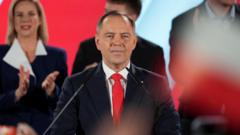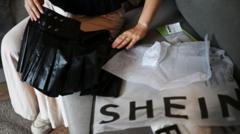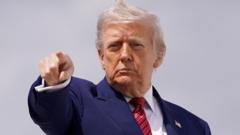The European Union has initiated a formal investigation into TikTok over allegations of foreign interference in Romania's recent presidential election, citing concerns around disinformation and election integrity.
EU Launches Investigation into TikTok for Alleged Foreign Interference in Romanian Elections

EU Launches Investigation into TikTok for Alleged Foreign Interference in Romanian Elections
The European Union takes action against TikTok amid claims of Russian influence in Romania's presidential race.
The European Union's executive branch has initiated an investigation into TikTok following "serious indications" of foreign interference in the recent Romanian presidential election. This probe comes after declassified intelligence suggested that around 25,000 TikTok accounts were activated shortly before the first round of voting, predominantly promoting the independent, far-right candidate Calin Georgescu. Georgescu, who has pointedly expressed admiration for Russia's Vladimir Putin, has distanced himself from claims of being a supporter of the Russian leader.
European Commission President Ursula von der Leyen emphasized the importance of safeguarding democracies from external meddling, declaring that all online platforms, including TikTok, must face accountability for any suspected interference. EU regulators plan to scrutinize TikTok's advertising practices and its content recommendation algorithms to determine if they violate the Digital Services Act (DSA), which is aimed at curbing disinformation and illegal activities online.
In a statement, von der Leyen asserted urgency in addressing electoral interference, stating, “Whenever we suspect such interference, especially during elections, we must act swiftly and firmly.” She stressed that protecting the integrity of elections is paramount. The allegations against TikTok include promotional content for Georgescu not being marked appropriately as electoral material, which is illegal under Romanian law.
With Russian intelligence identifying Romania as a priority target, an independent investigation has revealed that a single TikTok account incurred $381,000 in promotional expenses for Georgescu's campaign, despite his assertions of not personally funding these activities. TikTok has firmly denied the allegations, asserting that allegations of differential treatment regarding Georgescu's account are "categorically false."
Additionally, the EU's investigation will take into account the potential risks posed by TikTok's algorithm, particularly its ability to tailor content based on user preferences and interactions. Following a directive from the EU on December 5, TikTok has been instructed to safeguard internal documents related to its content recommendation processes and any countermeasures against "intentional manipulation." This investigation is regarded as a priority and is part of a broader inquiry into TikTok's compliance with the DSA concerning harmful content and the protection of minors.
Prior to the cancellation of the runoff vote, intelligence reports indicated that Georgescu's unexpected rise in popularity could be attributed to a “highly organized" social media campaign employing synchronized messaging. As the situation unfolds, Georgescu is juxtaposed against reformist candidate Elena Lasconi, with both vying for electoral support, further complicating the political landscape amid ongoing tensions between Ukraine and Russia.





















